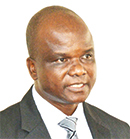An HIV free generation is every ones' responsibility
Parents and adolescents world over tend to be uncomfortable talking about sexual topics

By Dr Nelson Musoba
The International Youth Day presents us an opportunity to reflect and review progress of commitments made towards ending AIDS which is currently afflicting young people more than before.
We all aspire for a generation free of AIDS and this is possible, but will only be achieved, if we implement the right interventions that target vulnerable groups which include the poor, women, young people among other marginalised groups.
In July 2019, the First Lady and Minister for Education, Janet Kataha Museveni convened an inter-ministerial committee on adolescent girls' agenda to review progress on identified priorities in the national multi-sectoral coordination framework for the adolescent girl agenda.
The efforts are co-ordinated by the Ministry of Gender, Labour and social development, which provide expert guidance and leadership on the intersecting vulnerabilities affecting adolescent girls. It focuses on nine key priority vulnerabilities with HIV/AIDs as one of them.
This illustrates one of the efforts by government to invest in the second decade of life of an adolescent girl and deliver a package of interventions as part of the life cycle approach for sustainable results.
According to the National Planning Authority, the adolescent girl population grew from 6.2 million in 2002 to 8.8 million in 2014 and expected to double by 2050. This youth bulge can be asset, but only if we keep these young people AIDS free and implement vocational programmes and livelihood skills that will link them to productive occupations.
The key underlying vulnerabilities that predispose young people to new HIV infections include poverty, retrogressive gender and negative cultural norms and practices that include child marriages, low primary school completion rates, breakdown of the family unit and value systems linked to limited knowledge among young people and their parents about HIV and AIDS transmission risks and methods of prevention.
Engaging young people, especially adolescents, therefore, is an important aspect for our work at Uganda AIDS Commission because this strategy forms part of the critical pathway to reducing new HIV infections.
According to the recent Uganda Population-Based HIV Impact Assessment (UPHIA) released by the Ministry of Health, showed that almost half of young people interviewed did not have comprehensive knowledge about HIV transmission.
This means that investing in correct and consistent messaging and behavioural campaigns is critical in addressing high risk behaviours that expose young people to risk of new HIV infections because their low levels of comprehensive of HIV transmission.
The current success with implementation of the HIV and AIDS programme in Uganda is largely attributable to the early realisation by the actors in early days of epidemic that HIV and AIDS was not just a public health problem and, therefore, the solution lay in adopting a mainstreaming and promoting a multisectoral approach.
Parents and adolescents world over tend to be uncomfortable talking about sexual topics, yet discussions around those topics is critical because they can reassure and empower children.
These discussions provide priceless knowledge and information to young children. Parents and parental figures have an important role to play in gender and sexual socialisation and in guiding their children and reinforcing positive behaviour.
The family unit is a critical target to approach the problem by empowering caretakers (parents and guardians) to ensure children have age appropriate information about sexuality from an early age before these young get incomplete or incorrect information from other sources (social media, TV and their peers). Instilling moral values is another additional layer that can act as a safe guard.
Faith-based leaders are, therefore, critical in passing the correct messages to their followers majority of whom are young people. Uganda AIDS Commission has worked with Interreligious Council of Uganda (IRCU) as an indigenous national faith based organisation uniting efforts of religious institutions to jointly address issues of common concern among which is HIV and AIDS to develop a pastoral letter.
The pastoral letter is a simplified guide to religious leaders to pass an HIV prevention message to their audiences.
It is important for us all to stop looking at HIV/AIDS as an issue for medical professionals or people involved in public health alone. HIV/AIDS should be treated as everybody's concern including family members, friends, the bodaboda riders, hotel owners; construction workers, employers etc., because all these individuals and institutions are impacted by HIV and AIDS, which ultimately impacts productivity and economic growth.
Uganda AIDS Commission continues to reach out to everyone with HIV policies, strategies and including prevention messages through their umbrella organisations and ensuring that these umbrella organisations fulfil their responsibility of passing on this information to their members.
As an example during the recently concluded national candle light memorial events that were held in Kampala, young people spearheaded organisation of the event while Uganda AIDS Commission only provided guidance and quality assurance.
This was done through one of the young people's organisation called Uganda Network of Young People Living with HIV/AIDS- UNYPA.
The young people demonstrated great leadership and did a great job in mobilising and sharing HIV prevention information with their peers throughout the country.
The key lesson here was that when it comes to reaching out to the adolescents with HIV/AIDS messages, it is important that young people are at the forefront of all key interventions and strategies. Currently, there are several interventions targeting young people including HIV prevention information and messages.
The implementing partners responsible for design and development of these strategies are encouraged to involve young people in creation, testing and dissemination of these messages which is likely to have higher success rates than if they adopt an inclusive approach.
The writer is the director general, Uganda AIDS Commission